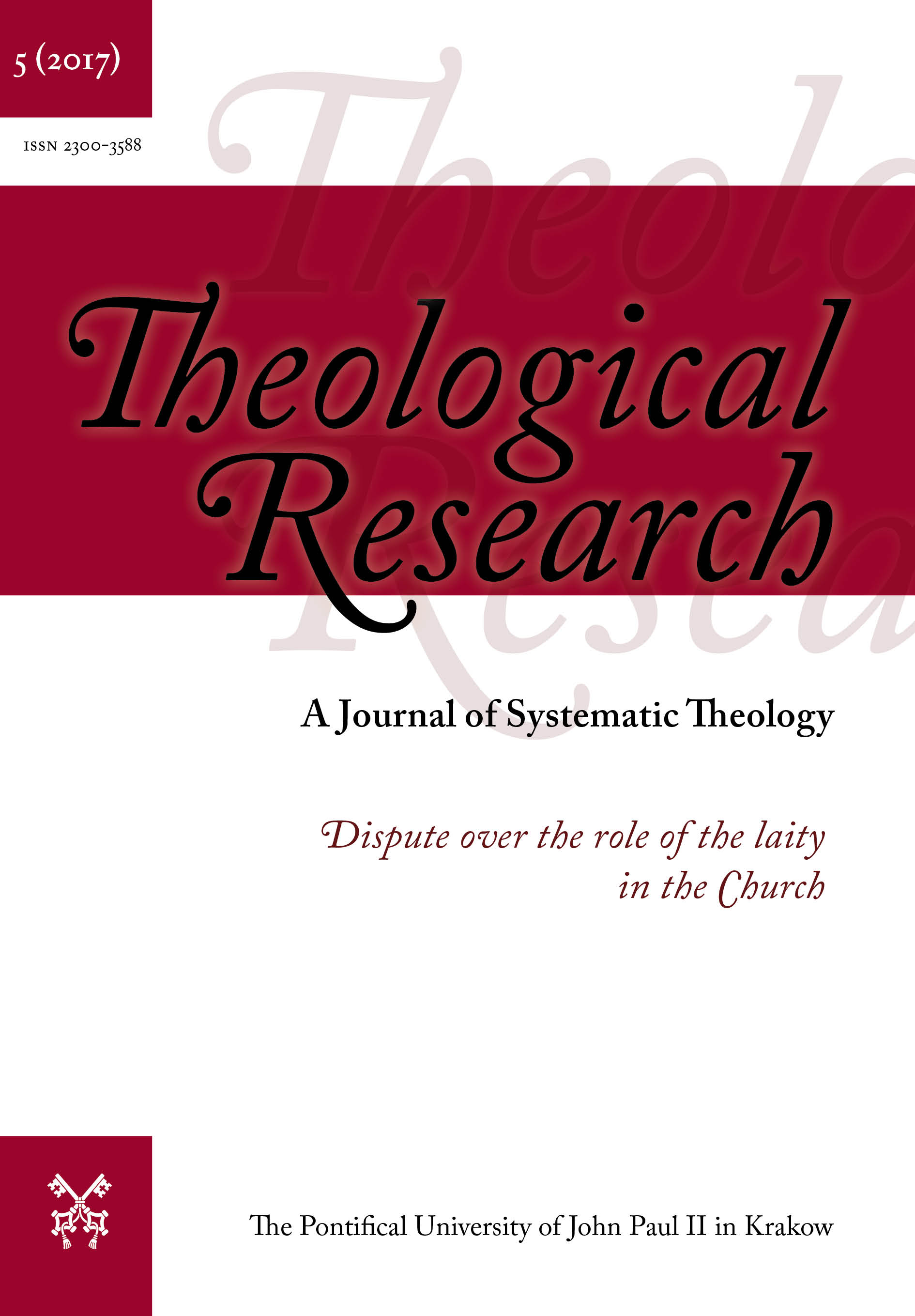Imago Christi or “just” Imago Mariae? Women and the Problem of Image and Imitation
DOI:
https://doi.org/10.15633/thr.3300Słowa kluczowe:
Jesus Christ, Mary, woman, image, model, imitationAbstrakt
The main question discussed in this paper is: Can we say that, in the light of orthodox Catholic theology, woman is an image of Christ in a way equal to man? How Jesus and His Mother should be treated as examples for imitation for Christians of both sexes on this ground? The first part of the article explains the terms imago Dei and imago Christi, and connection between them in their biblical, dogmatical, and contemporary theological-anthropological context, the last one understood strictly as anthropology in documents of the Catholic Magisterium published during and after II Vatican Council. The second part concerns the problem of Jesus and Mary as models for men, and/or women in the present day, on the basis of Church documents, especially Mariological ones. The third part considers the problem of women as imago Christi in the light of Catholic feminist theology. Conclusions are proposed at the end of the paper.
Bibliografia
Congregation for the Doctrine of the Faith, Declaration on the Question of Admission of Women to the Ministerial Priesthood “Inter insigniores”, „Acta Apostolicae Sedis” 69 (1977), pp. 98–116.
Congregation for the Doctrine of the Faith, Letter to the Bishops of the Catholic Church on the Collaboration of Men and Women in the Church and in the World, „Acta Apostolicae Sedis” 96 (2004), pp. 671–687.
Eusèbe de Césarée (Eusebius of Caesarea), Histoire ecclésiastique v–vii, in: Eusèbe de Césarée, Histoire ecclésiastique, vol. 2, Paris 1955 (Sources Chrétiennes, 41).
Grégoire de Nazianze (Gregory of Nazianzus), Lettre 101,32 (Du même, au prêtre Clédonios, première lettre), in: Grégoire de Nazianze, Lettres Théologiques, Paris 1974 (Sources Chrétiennes, 208).
Gregorii Theologi (Gregory of Nazianzus), Epistola CI (Ad Cledonium Presbyterum contra Apollinarium, epistola i), in: Gregorii Theologi, Opera quae exstant omnia, Turnholti 1990 (Patrologia Graeca, 37).
Johnson E. A., She Who Is. The Mystery of God in Feminist Theological Discourse, New York 1994.
New Jerusalem Bible, 1985.
Paul VI, Apostolic Exhortation Signum Magnum, „Acta Apostolicae Sedis” 59 (1967), pp. 465–475.
Paul VI, Apostolic Exhortation Marialis cultus, „Acta Apostolicae Sedis” 66 (1974), pp. 113–168.
Pius IX, Bull Ineffabilis Deus, 8th December 1854.
Pius XII, Encyclical Fulgens Corona, „Acta Apostolicae Sedis” 45 (1953), pp. 577–592.
Rahner K., On the Theology of the Incarnation, in: Theological Investigation, vol. 4, London–Baltimore 1966, pp. 105–120.
Ruether R. R., Sexism and God-Talk. Toward a Feminist Theology, Boston 1983.
Ruether R. R., The Liberation of Christology from Patriarchy, in: Feminist Theology. A Reader, ed. A. Loades, Louisville–London 1990, pp. 138–148.
The Oecumenical Documents of the Faith. The Creed of Nicaea. Three Epistles of Cyril. The Tome of Leo. The Chalcedonian Definition, ed. T. H. Bindley, London 1899.
Thomas Aquinas, The Summa Theologica, trans. Fathers of the English Dominican Province, 1947.
II Vatican Council, Constitution on the Sacred Liturgy Sacrosanctum Concilium, „Acta Apostolicae Sedis” 56 (1964), pp. 97–138.
II Vatican Council, Dogmatic Constitution on the Church Lumen Gentium, „Acta Apostolicae Sedis” 57 (1965), pp. 5–75.
Pobrania
Opublikowane
Numer
Dział
Licencja
Autrzy publikujący w czasopiśmie "Theological Research" zgadzają się na następujące zasady:
a. Autorzy przenoszą na rzecz Uniwersytetu Jana Pawła II w Krakowie (UPJPII) autorskie prawa majątkowe do swoich tekstów.
b. UPJPII udostępnia teksty na platformie wydawniczej, na licencji Creative Commons Uznanie autorstwa-Użycie niekomercyjne-Bez utworów zależnych 3.0 Polska, która umożliwia ich pobieranie i udostępnianie (np. w repozytoriach naukowych), o ile zostaną spełnione warunki:
- podany autor i tytuł tekstu,
- podane miejsce publikacji (tytuł czasopisma i adres internetowy do oryginalnie opublikowanego tekstu),
- tekst będzie dystrybuowany w sposób niekomercyjny.

